Emotional changes that occur during puberty
1. Feeling overly sensitive
During puberty, since your body undergoes many changes, it is common to feel uncomfortable about them and become overly sensitive about your physical appearance. As a result you may feel irritated quite easily, lose your temper or feel depressed. It will be useful to be aware of the changes in your behaviour and talk about it with someone that you're comfortable talking to.
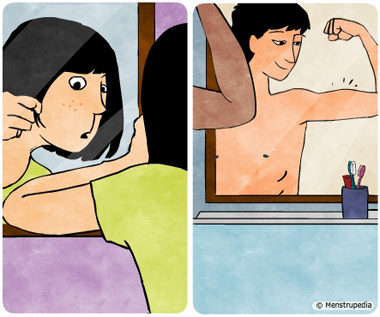
2. Looking for an identity
Since you are in the process of becoming an adult, you may feel inclined to figure out what makes you unique as a person. There is also a general tendency that you associate more with your friends than your family members. Psychologically, it may be because your friends are going through a similar phase as you. You may try to figure out how you are different from others and how you fit into the world. This may eventually lead to some sort of a struggle to become more independent of your parents and family.
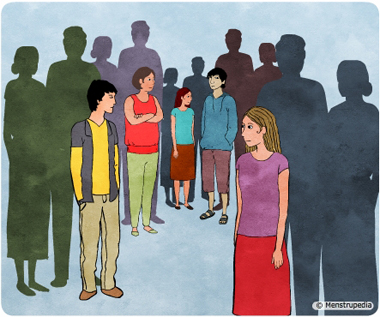
3. Feeling uncertain
Since you're not completely an adult and are not a child anymore, puberty can potentially lead to uncertain times. As a transition phase, you may begin to wonder and think about new and unfamiliar aspects of life such as career, livelihood and marriage. Since, all of this is new and unfamiliar when you start thinking along these directions, you may feel uncertain about the future.
This uncertainty becomes more evident when the expectations that people close to you have from you also change. You may be expected to take on greater responsibilities than what was expected from you as a child. Eventually you will grow into your new roles and become more certain about yourself, but this process will take its own time depending on how you respond to this situation.
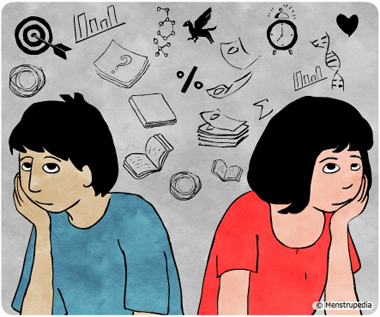
4. Peer pressure
With the onset of puberty, your conversations with your friends will increase. Your peer group and you are likely to be influenced by what you see around you in popular media and the culture that is represented through them. You might often pick up on what's in and what's out in terms of the way you dress, your language and even your behaviour depending upon what you see.
This maybe uncomfortable at times and would probably even change your likes and dislikes. It's also one of the ways in which you struggle to fit in with your peers. These events can lead to a gap between what is perceived as appropriate by your parents and your friends.

5. Conflicting thoughts
Since you are somewhere in between as a teenager during puberty, you may feel stuck between how you were as a child and how you wish to be as an adult. For example, you might want to be more independent and at the same time, might also look for support from your parents. Another example could be along the lines of whether you wish to give up on your interests that you had as a child to be able to fit in with your friends. As a result you may feel conflicted and look for clarity.
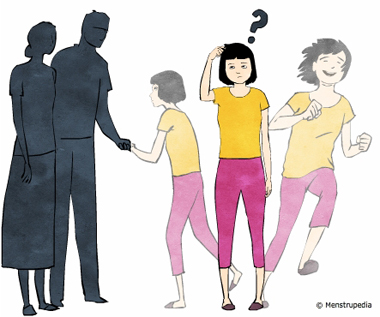
6. Mood swings
To add to the uncertainty and conflicting thoughts, you may also experience frequent and sometimes extreme changes in your mood. For example, sometimes your mood will swing between feeling confident and happy to feeling irritated and depressed in a short span of time. These frequent swings in how you feel are called mood swings. They may occur due to shifting levels of hormones in your body and other changes taking place during puberty.

7. Feeling conscious about self
The onset of puberty can vary on an individual basis. Therefore the way you grow maybe different from the way your friends grow. This can make you conscious about the way you're growing up and your body.
These experiences are more pronounced for girls because they develop faster and earlier than boys. Also the changes in their bodies such as development of breasts and widening of hips are more noticeable. This may make them feel more conscious about their body in presence of their peers of the same age group.
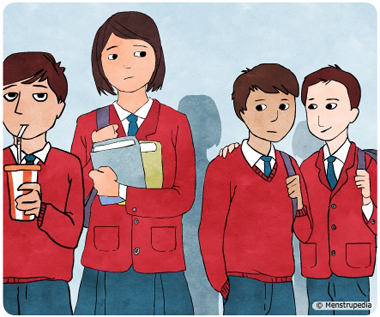
8. Getting sexual feelings
Puberty is also the phase after which you develop sexual maturity. Sexual maturity is the stage of your life when you can have children. One aspect of sexual maturity is being curious about sex and also about bodies of people that you are attracted to. With the onset of puberty, it is normal for a boy or a girl to be sexually attracted to people that they would want be more than 'just friends' with.
You may also feel sexually excited by normal everyday activities such as reading a romantic novel or watching a romantic scene on television. These feelings are normal and there is nothing to feel guilty about. You may have many questions about sex. It is a good idea to talk to a mature adult (like your mother, doctor or a counselor) with whom you're comfortable discussing sex. You should get your questions answered and should stay informed on safe sex.

References:
- Social and emotional changes in adolescence, http://raisingchildren.net.au



